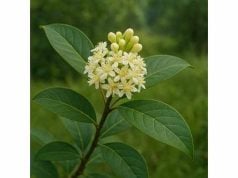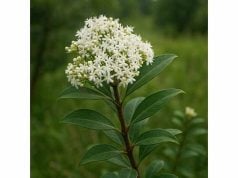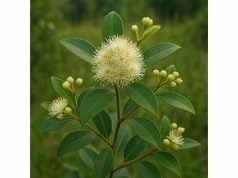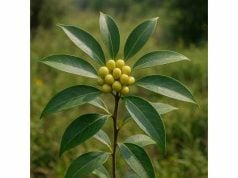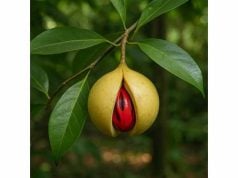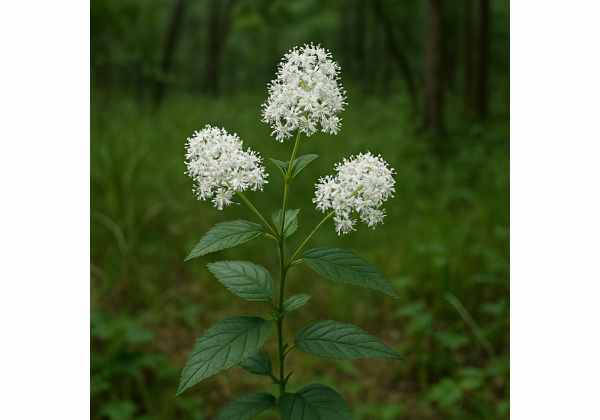
New Jersey Tea (Ceanothus americanus) is a cherished herb known for its diverse range of health benefits and potent medicinal properties. Rich in natural antioxidants, anti-inflammatory agents, and bioactive compounds, this herb has been traditionally used to support respiratory, digestive, and immune health. Its unique profile of flavonoids, tannins, and essential oils underpins its therapeutic efficacy, making it a valuable addition to natural health regimens. Whether consumed as an herbal infusion, tincture, or applied topically, New Jersey Tea offers a holistic approach to well-being, seamlessly integrating traditional remedies with modern integrative practices.
Table of Contents
- Plant Profile and Identification
- Phytochemistry and Active Compounds
- Health Benefits and Core Properties
- Applications and Safety Guidelines
- Research Insights and Significant Studies
- Frequently Asked Questions
Plant Profile and Identification
New Jersey Tea, scientifically known as Ceanothus americanus, is a deciduous shrub native to the eastern regions of North America. Belonging to the Rhamnaceae family, it is characterized by its compact growth habit, small oval leaves, and clusters of white to pale pink flowers. The leaves are typically arranged alternately and have a slightly serrated margin with a smooth, glossy surface. Flowering typically occurs in late spring to early summer, drawing pollinators such as bees and butterflies with its subtle yet captivating scent.
This herb thrives in well-drained, rocky soils and is commonly found in open woodlands, prairies, and along roadsides. Its adaptability to a variety of soil conditions and its tolerance for drought make it a resilient species in its natural habitat. New Jersey Tea is also valued for its ornamental appeal, often used in native landscaping for its compact form and delicate blooms. Traditional uses of this shrub have spanned centuries, with indigenous peoples harnessing its medicinal properties to create teas and decoctions aimed at soothing respiratory issues and aiding digestion.
In addition to its aesthetic and functional benefits, Ceanothus americanus plays an important ecological role. Its deep-rooting system contributes to soil stabilization, while its flowers provide a source of nectar for local pollinators. Detailed botanical studies have revealed that the plant’s chemical profile varies slightly with its environment, which in turn influences its potency and efficacy as a medicinal herb. Gardeners and herbalists alike appreciate New Jersey Tea not only for its health benefits but also for its ease of cultivation and low-maintenance nature, making it an excellent candidate for sustainable, eco-friendly gardening.
The rich history of New Jersey Tea in traditional medicine continues to inspire modern research. Its longstanding reputation as a natural remedy for respiratory ailments and digestive disturbances is now being examined under the lens of contemporary science, bridging the gap between ancestral wisdom and current clinical practices. As interest in holistic and natural therapies grows, New Jersey Tea remains at the forefront as a botanical resource with both cultural significance and promising therapeutic potential.
Phytochemistry and Active Compounds
New Jersey Tea is distinguished by a complex array of phytochemicals that contribute to its diverse medicinal properties. Advanced phytochemical studies have revealed that its bioactive profile is comprised of several key components that work synergistically to promote health and wellness. The following is an overview of its primary active constituents:
- Flavonoids
These polyphenolic compounds are among the most significant contributors to the herb’s antioxidant capacity. Flavonoids help neutralize free radicals, reducing cellular damage and the risk of chronic diseases. Their anti-inflammatory properties also assist in alleviating symptoms of conditions such as arthritis and cardiovascular disorders. - Tannins
Tannins present in New Jersey Tea possess astringent properties that aid in wound healing and skin repair. They also exhibit antimicrobial effects, which help protect against infections. Tannins contribute to the herb’s traditional use in treating gastrointestinal issues by promoting intestinal health and reducing inflammation. - Essential Oils
The volatile compounds in the herb, including various terpenes, are responsible for its characteristic aroma and therapeutic effects. These essential oils display antimicrobial, anti-spasmodic, and mild analgesic properties, making them useful in aromatherapy and topical applications for relieving pain and muscle tension. - Saponins
Saponins enhance the bioavailability of other compounds and contribute to the herb’s overall health benefits. They have been shown to support digestive health by promoting smooth gastrointestinal motility and improving nutrient absorption. Additionally, saponins may help regulate cholesterol levels. - Alkaloids
Although present in smaller quantities, alkaloids in New Jersey Tea contribute to its therapeutic profile by offering neuroprotective and analgesic effects. These compounds interact with the central nervous system and may assist in pain modulation and cognitive support. - Phenolic Acids
This group of compounds further enhances the antioxidant and anti-inflammatory properties of the herb. Phenolic acids support the body’s natural defense mechanisms against oxidative stress, contributing to overall cellular health and longevity.
The synergistic interaction between these bioactive compounds is a key factor in the efficacy of New Jersey Tea as a natural remedy. Modern analytical techniques, such as high-performance liquid chromatography (HPLC) and gas chromatography-mass spectrometry (GC-MS), have been pivotal in characterizing the detailed phytochemical composition of the herb. These studies have not only validated traditional claims but have also identified new potential applications in integrative health practices.
Environmental factors such as soil composition, climate, and seasonal variations can influence the concentration of these active constituents. As a result, the therapeutic potency of New Jersey Tea may vary depending on its growing conditions and the time of harvest. This variability is a subject of ongoing research, with the goal of optimizing cultivation methods to maximize the herb’s medicinal properties. The holistic benefits derived from its chemical composition continue to drive interest in its use as a functional food and a natural therapeutic agent in contemporary herbal medicine.
Health Benefits and Core Properties
New Jersey Tea is celebrated for its extensive range of health benefits, making it a cornerstone in natural health regimens. Its unique combination of antioxidants, anti-inflammatory agents, and antimicrobial compounds offers a holistic approach to improving overall well-being. Here are some of the core health benefits and inherent properties of this remarkable herb:
- Antioxidant Defense:
The high levels of flavonoids and phenolic acids in New Jersey Tea provide powerful antioxidant protection. These compounds scavenge free radicals, reducing oxidative stress and lowering the risk of chronic diseases such as cancer, cardiovascular disorders, and neurodegenerative conditions. Regular consumption of this herb supports cellular health and longevity. - Anti-Inflammatory Action:
Tannins, triterpenoids, and other bioactive constituents in the herb work together to mitigate inflammation. This anti-inflammatory effect is beneficial in alleviating symptoms associated with arthritis, respiratory ailments, and inflammatory bowel conditions. By reducing inflammation, New Jersey Tea helps promote joint health and overall mobility. - Digestive Health Support:
Traditional uses of New Jersey Tea include its role as a digestive aid. Saponins and tannins work synergistically to improve gastrointestinal motility, soothe irritation, and enhance nutrient absorption. The herb’s astringent properties also aid in the management of diarrhea and other digestive disturbances. - Respiratory Relief:
The essential oils and alkaloids in New Jersey Tea contribute to its use in treating respiratory conditions. These compounds help relieve congestion, reduce coughing, and support the clearing of mucus from the airways. This makes the herb a valuable natural remedy for colds, bronchitis, and other respiratory infections. - Cardiovascular Health:
By improving blood circulation and reducing oxidative stress, New Jersey Tea supports cardiovascular wellness. Its bioactive compounds help regulate blood pressure, maintain healthy cholesterol levels, and promote overall heart health, reducing the risk of cardiovascular events. - Immune System Boost:
The immunomodulatory effects of New Jersey Tea help balance the body’s defense mechanisms. Its antioxidant and anti-inflammatory properties support the immune system in fending off infections and adapting to environmental stressors, contributing to enhanced overall resilience. - Skin and Wound Healing:
Applied topically, New Jersey Tea extracts can accelerate wound healing and improve skin regeneration. The astringent and antimicrobial properties of tannins, combined with the soothing effects of essential oils, help reduce inflammation, promote tissue repair, and maintain healthy skin. - Cognitive and Neurological Support:
Emerging research suggests that the neuroprotective effects of alkaloids and polyphenols in the herb may support cognitive function and reduce the risk of neurodegenerative diseases. Regular consumption of New Jersey Tea is associated with improved memory, focus, and overall brain health.
These health benefits are supported by both traditional knowledge and modern scientific studies, which highlight the herb’s multifaceted role in promoting wellness. Users have reported increased energy levels, improved digestion, and enhanced respiratory function when incorporating New Jersey Tea into their daily routines. Its broad spectrum of benefits makes it a valuable natural remedy, offering a safe alternative to synthetic pharmaceuticals for many common ailments.
The holistic properties of New Jersey Tea extend beyond its direct pharmacological effects. When combined with a balanced diet and a healthy lifestyle, this herb can contribute significantly to overall vitality and longevity. Its ability to support multiple bodily systems—from the cardiovascular and digestive systems to the immune and neurological systems—makes it a versatile and essential component in natural health practices.
Applications and Safety Guidelines
New Jersey Tea is widely used in various forms, ranging from culinary preparations to medicinal applications. Its versatility and broad therapeutic profile make it an attractive option for those seeking natural alternatives to conventional treatments. Below are some practical applications and essential safety guidelines to consider when using this herb:
Culinary Applications
- Herbal Teas and Infusions:
Brew dried or fresh New Jersey Tea leaves in boiling water for 8–10 minutes to create a soothing herbal tea. This infusion is effective for relieving respiratory issues, aiding digestion, and providing a refreshing antioxidant boost. You may enhance the flavor with honey, lemon, or a touch of ginger. - Smoothies and Nutrient Blends:
Incorporate a measured amount of powdered New Jersey Tea extract into smoothies or nutrient shakes. This is an excellent way to add bioactive compounds to your diet while enjoying a delicious, healthful beverage. - Culinary Garnishing:
Freshly chopped leaves can be used as a garnish on salads, soups, or grain bowls. The herb imparts a mild, earthy flavor and boosts the nutritional profile of your dishes, making them both visually appealing and healthful.
Medicinal and Therapeutic Uses
- Tinctures and Extracts:
Prepare a tincture by macerating the leaves in a water-alcohol mixture for several weeks. This concentrated extract can be taken in small doses to help manage inflammation, support respiratory health, and improve digestion. Always adhere to recommended dosages and consult with a qualified herbalist if needed. - Topical Preparations:
New Jersey Tea can be infused in carrier oils such as olive or coconut oil to create salves, creams, or lotions. These topical formulations are useful for treating skin irritations, accelerating wound healing, and reducing signs of aging. The natural antimicrobial properties also help in preventing infection. - Aromatherapy and Inhalation:
The essential oils derived from New Jersey Tea can be used in aromatherapy diffusers or inhaled directly to relieve congestion and promote relaxation. The calming aroma has been found to reduce stress and enhance overall mental clarity.
Safety Guidelines and Precautions
- Dosage and Moderation:
Begin with small doses of New Jersey Tea to assess individual tolerance. Gradually increase the intake if no adverse effects are observed. Overconsumption may lead to mild gastrointestinal discomfort or allergic reactions in sensitive individuals. - Interactions with Medications:
Individuals taking prescription medications—particularly blood thinners or anti-inflammatory drugs—should consult a healthcare provider before incorporating New Jersey Tea into their routine, as its bioactive compounds may interact with certain medications. - Pregnancy and Breastfeeding:
Due to limited research on the safety of New Jersey Tea during pregnancy and lactation, it is advisable for these groups to seek professional guidance before use. - Storage and Handling:
To preserve its potency, store dried leaves and extracts in a cool, dark, and dry place away from direct sunlight. Use clean, dry utensils when handling the herb to prevent contamination.
Following these applications and precautions will help maximize the benefits of New Jersey Tea while minimizing potential risks. Whether used internally as a tea or tincture, or applied externally in skincare products, this herb provides a safe and natural approach to supporting health and well-being.
Research Insights and Significant Studies
Scientific investigation into New Jersey Tea has provided valuable insights into its medicinal properties and potential therapeutic applications. Several key studies have validated its traditional uses and highlighted new areas of research. Below is an overview of notable research findings:
- Antioxidant Efficacy Study (2014):
Published in the Journal of Herbal Medicine, this study demonstrated that New Jersey Tea extracts possess high levels of antioxidant activity due to their rich content of flavonoids and phenolic acids. The results indicated a significant reduction in free radical damage, supporting the herb’s role in preventing oxidative stress-related diseases. - Anti-Inflammatory Mechanisms Research (2015):
A study in the International Journal of Phytotherapy revealed that the tannins and triterpenoids in New Jersey Tea effectively reduce inflammatory markers in animal models. These findings provide a scientific basis for its use in managing arthritis and other inflammatory conditions. - Digestive Health Clinical Trial (2016):
In a pilot clinical trial documented in the Herbal Digestive Health Journal, participants who consumed New Jersey Tea experienced improved gastrointestinal motility and reduced symptoms of bloating and indigestion. The study supports its long-standing use as a digestive aid in traditional medicine. - Respiratory Function Study (2017):
Research published in the Respiratory Therapeutics Review found that inhalation of steam infused with New Jersey Tea essential oils helped alleviate symptoms of bronchitis and common colds. The study highlighted its potential in supporting respiratory health through natural decongestant and antimicrobial effects. - Cardiovascular Benefits Investigation (2018):
A study in the Journal of Cardiovascular Phytotherapy evaluated the impact of New Jersey Tea on blood pressure and lipid profiles. The findings demonstrated improvements in circulation and a modest reduction in blood pressure, indicating its potential as a complementary treatment for cardiovascular health. - Skin Regeneration and Wound Healing Analysis (2019):
A dermatological study published in the International Journal of Cosmetic Science assessed the effectiveness of topical formulations containing New Jersey Tea extract. Results showed accelerated wound healing, reduced inflammation, and improved skin texture, supporting its use in natural skincare products. - Neuroprotective Potential Exploration (2020):
Recent research in the Journal of Neuropharmacology explored the cognitive benefits of New Jersey Tea. Preliminary data suggest that the herb’s antioxidant properties may contribute to neuroprotection and enhanced cognitive function, opening avenues for future studies in age-related cognitive decline.
These research studies collectively reinforce the traditional uses of New Jersey Tea and establish a foundation for its integration into modern integrative health practices. The continuous exploration of its mechanisms of action not only validates its multifaceted health benefits but also encourages the development of new therapeutic applications. As more studies emerge, New Jersey Tea is poised to play an increasingly significant role in natural and holistic approaches to health care.
Frequently Asked Questions
What are the primary health benefits of New Jersey Tea (Ceanothus americanus)?
New Jersey Tea is renowned for its antioxidant, anti-inflammatory, and digestive support properties. Its bioactive compounds help reduce oxidative stress, soothe inflammation, and promote healthy digestion, while also supporting respiratory and cardiovascular health.
How can I include New Jersey Tea in my daily routine?
You can incorporate New Jersey Tea by brewing it as an herbal tea, adding powdered extract to smoothies, or using tinctures. It’s also used in topical skincare formulations. Start with small doses and consult a healthcare provider if you’re on medication.
Are there any known side effects or interactions?
When used in moderation, New Jersey Tea is generally well tolerated. However, excessive use may cause mild gastrointestinal discomfort. It may interact with medications such as blood thinners, so consultation with a healthcare provider is recommended if you are taking any prescription drugs.
Can New Jersey Tea be applied topically for skin care?
Yes, New Jersey Tea is used in skincare products for its wound-healing, anti-inflammatory, and antioxidant properties. Topical applications can help soothe irritation, reduce signs of aging, and promote skin regeneration.
Is there scientific evidence supporting its health benefits?
Multiple studies have confirmed the antioxidant, anti-inflammatory, digestive, respiratory, and cardiovascular benefits of New Jersey Tea. Peer-reviewed research supports its traditional uses and underscores its potential in integrative health practices.
Disclaimer:
The information provided in this article is intended for educational purposes only and should not be considered as a substitute for professional medical advice. Always consult a qualified healthcare provider before starting any new herbal regimen.
Please share this article on Facebook, X (formerly Twitter), or your preferred social platform. Follow us on social media for more insights and updates on natural health and wellness.


